Housekeeping and Sustainability: Clean the World Program Evaluation
VerifiedAdded on 2021/12/28
|6
|1426
|105
Report
AI Summary
This report provides an overview of the Clean the World (CTW) program, a hotel industry initiative focused on recycling used toiletries to create hygiene kits for distribution to those in need. The program addresses the significant waste generated by hotels worldwide, where millions of toiletries are discarded daily. CTW partners with various organizations to distribute soap and hygiene kits in numerous countries, particularly in regions with high needs. The report highlights the environmental and economic benefits of CTW, including waste reduction, cost savings for hotels, and positive public relations. It discusses the misconceptions surrounding the program and addresses CTW's plans for expansion. The report also includes recommendations for promoting the program to hotel guests and emphasizes the importance of corporate support for sustainability efforts. The report concludes by acknowledging the impact of CTW on global welfare and its role in inspiring other hotel brands to adopt similar recycling platforms. References are included for further reading.
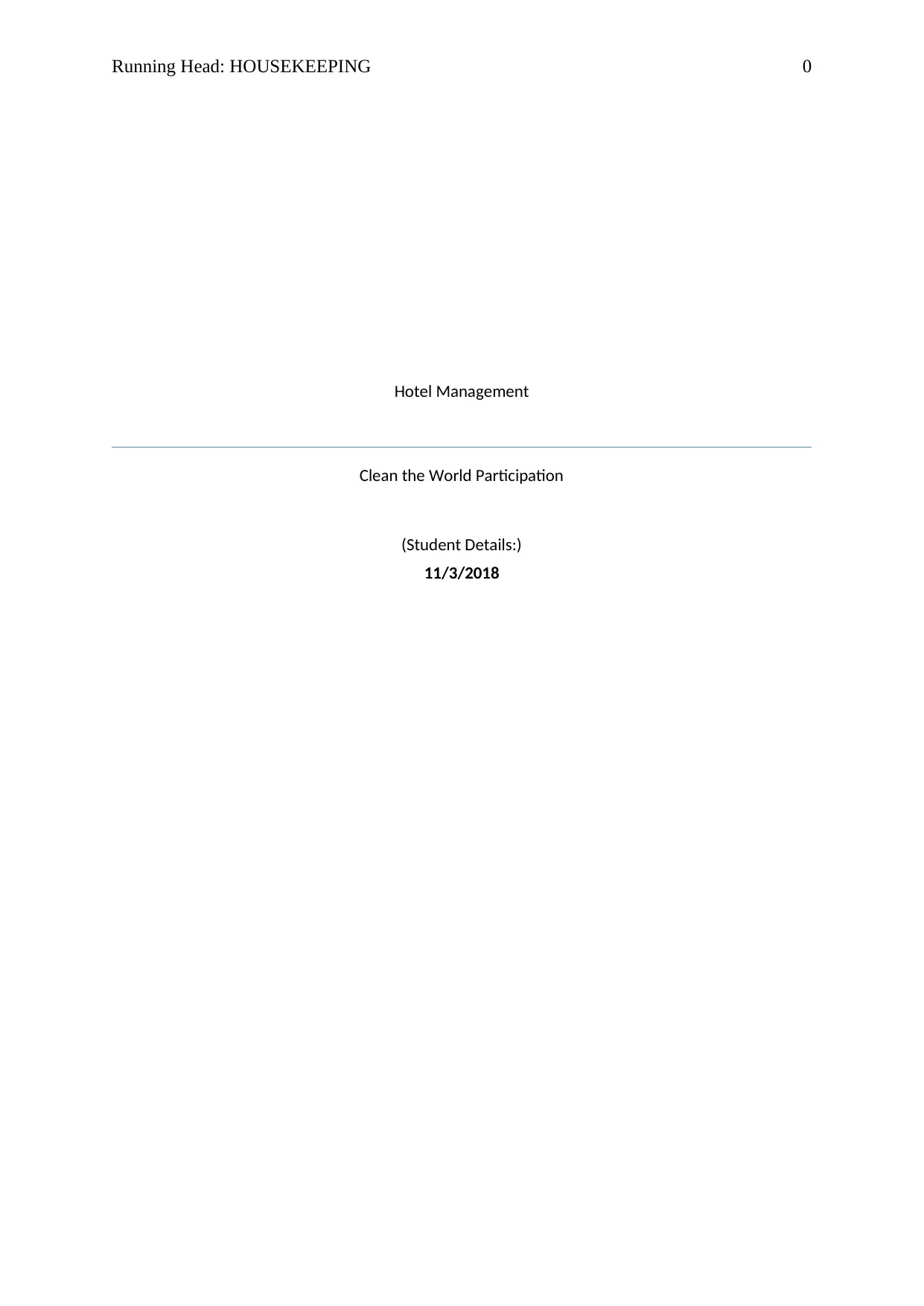
Running Head: HOUSEKEEPING 0
Hotel Management
Clean the World Participation
(Student Details:)
11/3/2018
Hotel Management
Clean the World Participation
(Student Details:)
11/3/2018
Paraphrase This Document
Need a fresh take? Get an instant paraphrase of this document with our AI Paraphraser
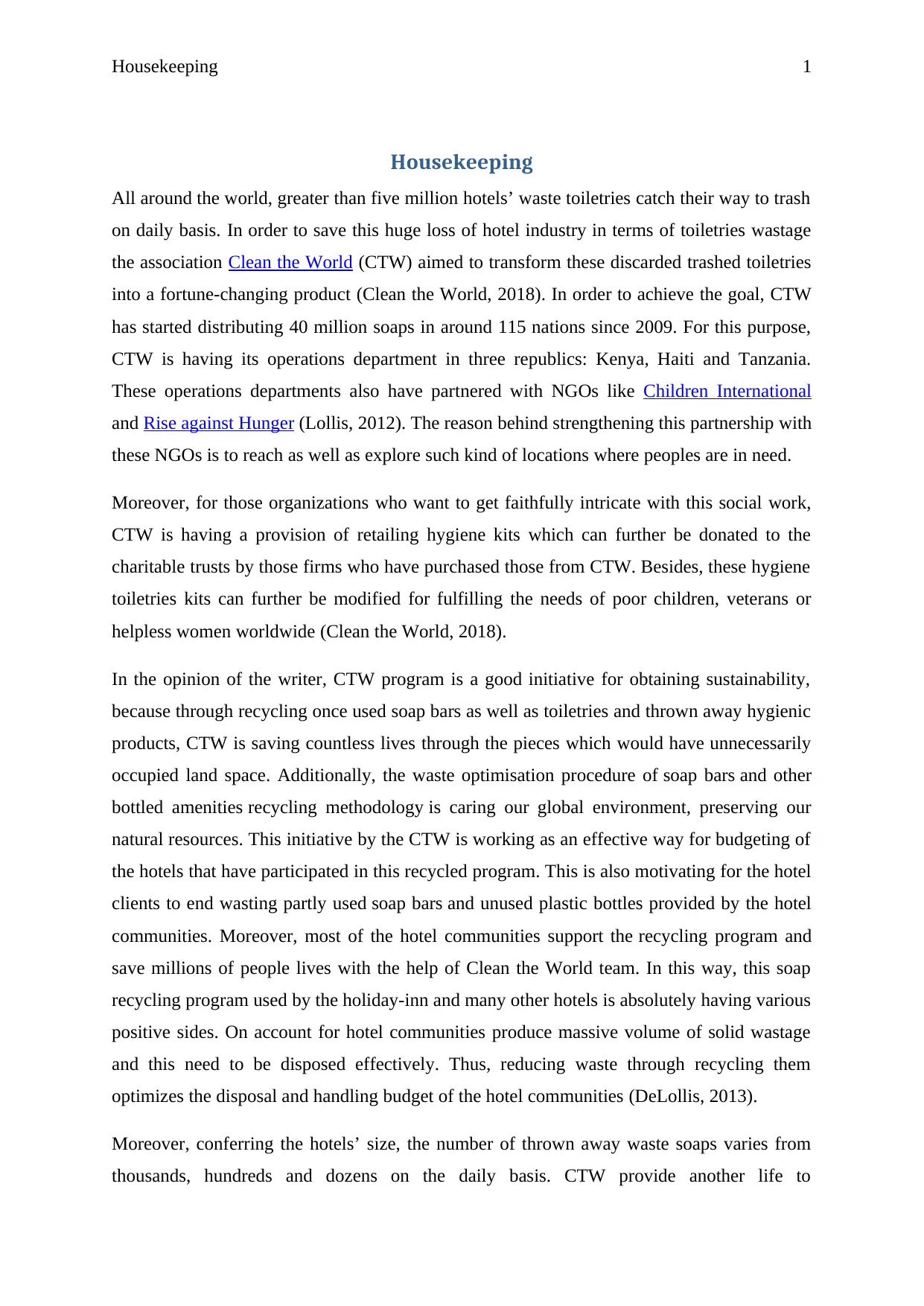
Housekeeping 1
Housekeeping
All around the world, greater than five million hotels’ waste toiletries catch their way to trash
on daily basis. In order to save this huge loss of hotel industry in terms of toiletries wastage
the association Clean the World (CTW) aimed to transform these discarded trashed toiletries
into a fortune-changing product (Clean the World, 2018). In order to achieve the goal, CTW
has started distributing 40 million soaps in around 115 nations since 2009. For this purpose,
CTW is having its operations department in three republics: Kenya, Haiti and Tanzania.
These operations departments also have partnered with NGOs like Children International
and Rise against Hunger (Lollis, 2012). The reason behind strengthening this partnership with
these NGOs is to reach as well as explore such kind of locations where peoples are in need.
Moreover, for those organizations who want to get faithfully intricate with this social work,
CTW is having a provision of retailing hygiene kits which can further be donated to the
charitable trusts by those firms who have purchased those from CTW. Besides, these hygiene
toiletries kits can further be modified for fulfilling the needs of poor children, veterans or
helpless women worldwide (Clean the World, 2018).
In the opinion of the writer, CTW program is a good initiative for obtaining sustainability,
because through recycling once used soap bars as well as toiletries and thrown away hygienic
products, CTW is saving countless lives through the pieces which would have unnecessarily
occupied land space. Additionally, the waste optimisation procedure of soap bars and other
bottled amenities recycling methodology is caring our global environment, preserving our
natural resources. This initiative by the CTW is working as an effective way for budgeting of
the hotels that have participated in this recycled program. This is also motivating for the hotel
clients to end wasting partly used soap bars and unused plastic bottles provided by the hotel
communities. Moreover, most of the hotel communities support the recycling program and
save millions of people lives with the help of Clean the World team. In this way, this soap
recycling program used by the holiday-inn and many other hotels is absolutely having various
positive sides. On account for hotel communities produce massive volume of solid wastage
and this need to be disposed effectively. Thus, reducing waste through recycling them
optimizes the disposal and handling budget of the hotel communities (DeLollis, 2013).
Moreover, conferring the hotels’ size, the number of thrown away waste soaps varies from
thousands, hundreds and dozens on the daily basis. CTW provide another life to
Housekeeping
All around the world, greater than five million hotels’ waste toiletries catch their way to trash
on daily basis. In order to save this huge loss of hotel industry in terms of toiletries wastage
the association Clean the World (CTW) aimed to transform these discarded trashed toiletries
into a fortune-changing product (Clean the World, 2018). In order to achieve the goal, CTW
has started distributing 40 million soaps in around 115 nations since 2009. For this purpose,
CTW is having its operations department in three republics: Kenya, Haiti and Tanzania.
These operations departments also have partnered with NGOs like Children International
and Rise against Hunger (Lollis, 2012). The reason behind strengthening this partnership with
these NGOs is to reach as well as explore such kind of locations where peoples are in need.
Moreover, for those organizations who want to get faithfully intricate with this social work,
CTW is having a provision of retailing hygiene kits which can further be donated to the
charitable trusts by those firms who have purchased those from CTW. Besides, these hygiene
toiletries kits can further be modified for fulfilling the needs of poor children, veterans or
helpless women worldwide (Clean the World, 2018).
In the opinion of the writer, CTW program is a good initiative for obtaining sustainability,
because through recycling once used soap bars as well as toiletries and thrown away hygienic
products, CTW is saving countless lives through the pieces which would have unnecessarily
occupied land space. Additionally, the waste optimisation procedure of soap bars and other
bottled amenities recycling methodology is caring our global environment, preserving our
natural resources. This initiative by the CTW is working as an effective way for budgeting of
the hotels that have participated in this recycled program. This is also motivating for the hotel
clients to end wasting partly used soap bars and unused plastic bottles provided by the hotel
communities. Moreover, most of the hotel communities support the recycling program and
save millions of people lives with the help of Clean the World team. In this way, this soap
recycling program used by the holiday-inn and many other hotels is absolutely having various
positive sides. On account for hotel communities produce massive volume of solid wastage
and this need to be disposed effectively. Thus, reducing waste through recycling them
optimizes the disposal and handling budget of the hotel communities (DeLollis, 2013).
Moreover, conferring the hotels’ size, the number of thrown away waste soaps varies from
thousands, hundreds and dozens on the daily basis. CTW provide another life to
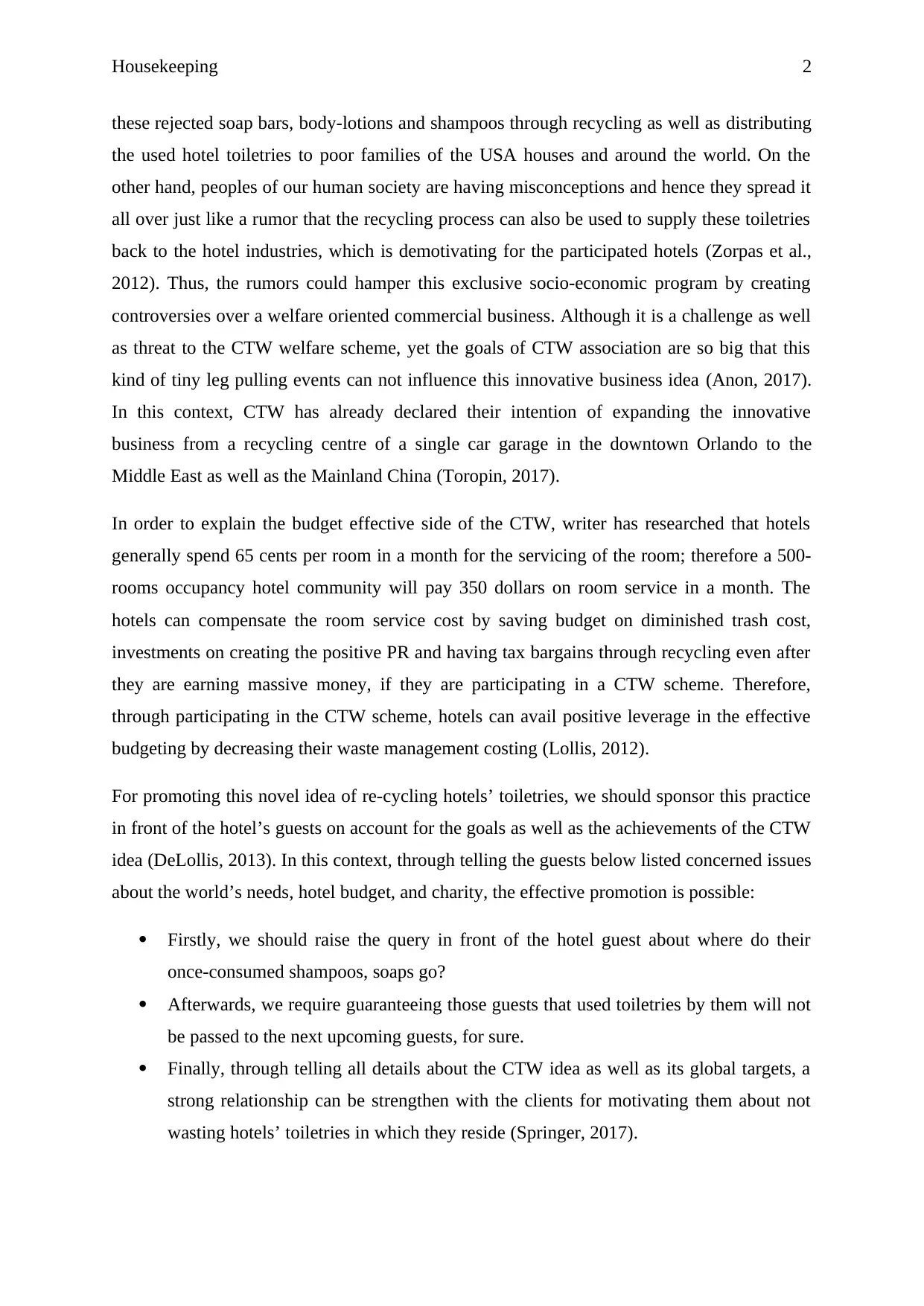
Housekeeping 2
these rejected soap bars, body-lotions and shampoos through recycling as well as distributing
the used hotel toiletries to poor families of the USA houses and around the world. On the
other hand, peoples of our human society are having misconceptions and hence they spread it
all over just like a rumor that the recycling process can also be used to supply these toiletries
back to the hotel industries, which is demotivating for the participated hotels (Zorpas et al.,
2012). Thus, the rumors could hamper this exclusive socio-economic program by creating
controversies over a welfare oriented commercial business. Although it is a challenge as well
as threat to the CTW welfare scheme, yet the goals of CTW association are so big that this
kind of tiny leg pulling events can not influence this innovative business idea (Anon, 2017).
In this context, CTW has already declared their intention of expanding the innovative
business from a recycling centre of a single car garage in the downtown Orlando to the
Middle East as well as the Mainland China (Toropin, 2017).
In order to explain the budget effective side of the CTW, writer has researched that hotels
generally spend 65 cents per room in a month for the servicing of the room; therefore a 500-
rooms occupancy hotel community will pay 350 dollars on room service in a month. The
hotels can compensate the room service cost by saving budget on diminished trash cost,
investments on creating the positive PR and having tax bargains through recycling even after
they are earning massive money, if they are participating in a CTW scheme. Therefore,
through participating in the CTW scheme, hotels can avail positive leverage in the effective
budgeting by decreasing their waste management costing (Lollis, 2012).
For promoting this novel idea of re-cycling hotels’ toiletries, we should sponsor this practice
in front of the hotel’s guests on account for the goals as well as the achievements of the CTW
idea (DeLollis, 2013). In this context, through telling the guests below listed concerned issues
about the world’s needs, hotel budget, and charity, the effective promotion is possible:
Firstly, we should raise the query in front of the hotel guest about where do their
once-consumed shampoos, soaps go?
Afterwards, we require guaranteeing those guests that used toiletries by them will not
be passed to the next upcoming guests, for sure.
Finally, through telling all details about the CTW idea as well as its global targets, a
strong relationship can be strengthen with the clients for motivating them about not
wasting hotels’ toiletries in which they reside (Springer, 2017).
these rejected soap bars, body-lotions and shampoos through recycling as well as distributing
the used hotel toiletries to poor families of the USA houses and around the world. On the
other hand, peoples of our human society are having misconceptions and hence they spread it
all over just like a rumor that the recycling process can also be used to supply these toiletries
back to the hotel industries, which is demotivating for the participated hotels (Zorpas et al.,
2012). Thus, the rumors could hamper this exclusive socio-economic program by creating
controversies over a welfare oriented commercial business. Although it is a challenge as well
as threat to the CTW welfare scheme, yet the goals of CTW association are so big that this
kind of tiny leg pulling events can not influence this innovative business idea (Anon, 2017).
In this context, CTW has already declared their intention of expanding the innovative
business from a recycling centre of a single car garage in the downtown Orlando to the
Middle East as well as the Mainland China (Toropin, 2017).
In order to explain the budget effective side of the CTW, writer has researched that hotels
generally spend 65 cents per room in a month for the servicing of the room; therefore a 500-
rooms occupancy hotel community will pay 350 dollars on room service in a month. The
hotels can compensate the room service cost by saving budget on diminished trash cost,
investments on creating the positive PR and having tax bargains through recycling even after
they are earning massive money, if they are participating in a CTW scheme. Therefore,
through participating in the CTW scheme, hotels can avail positive leverage in the effective
budgeting by decreasing their waste management costing (Lollis, 2012).
For promoting this novel idea of re-cycling hotels’ toiletries, we should sponsor this practice
in front of the hotel’s guests on account for the goals as well as the achievements of the CTW
idea (DeLollis, 2013). In this context, through telling the guests below listed concerned issues
about the world’s needs, hotel budget, and charity, the effective promotion is possible:
Firstly, we should raise the query in front of the hotel guest about where do their
once-consumed shampoos, soaps go?
Afterwards, we require guaranteeing those guests that used toiletries by them will not
be passed to the next upcoming guests, for sure.
Finally, through telling all details about the CTW idea as well as its global targets, a
strong relationship can be strengthen with the clients for motivating them about not
wasting hotels’ toiletries in which they reside (Springer, 2017).
⊘ This is a preview!⊘
Do you want full access?
Subscribe today to unlock all pages.

Trusted by 1+ million students worldwide
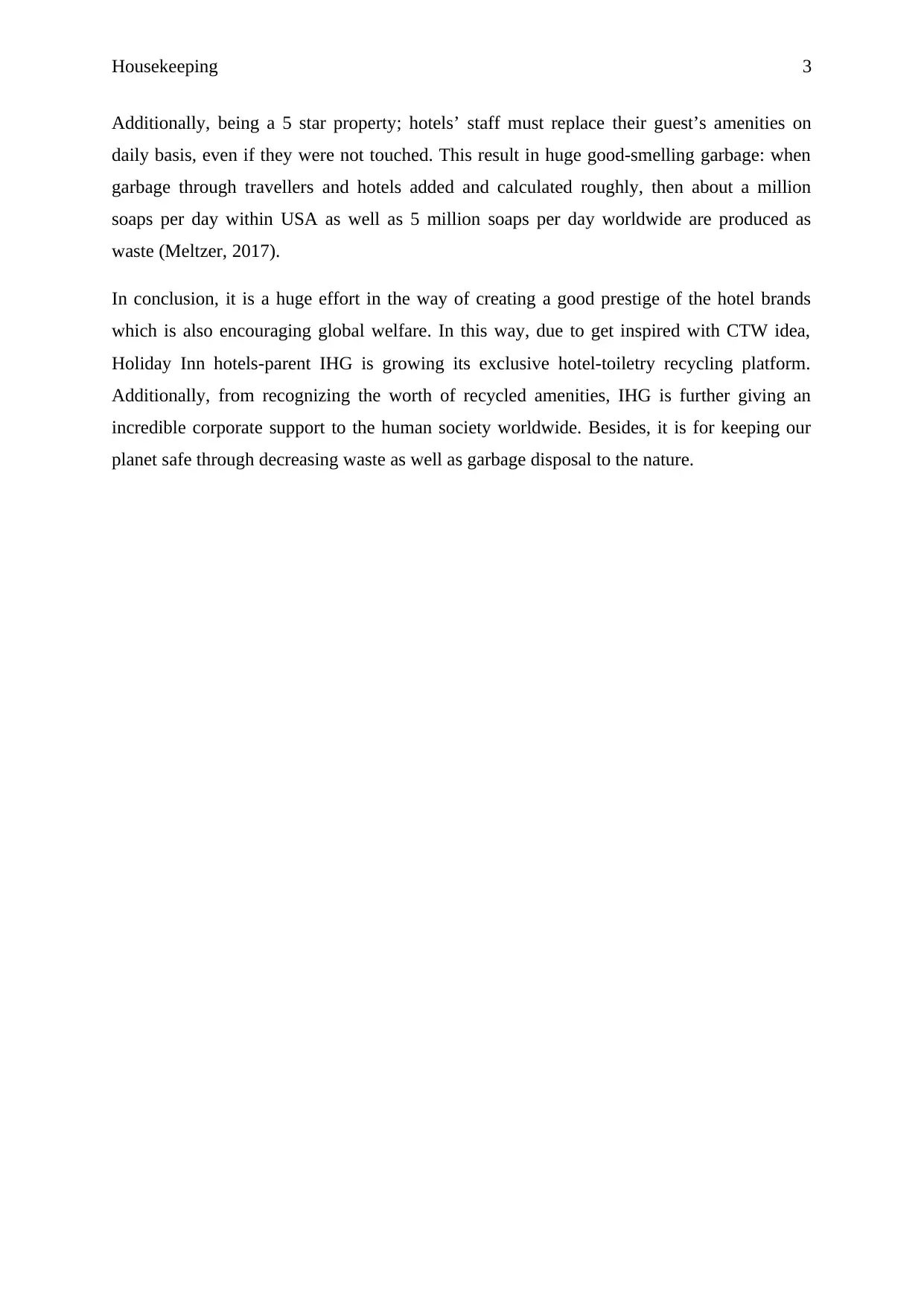
Housekeeping 3
Additionally, being a 5 star property; hotels’ staff must replace their guest’s amenities on
daily basis, even if they were not touched. This result in huge good-smelling garbage: when
garbage through travellers and hotels added and calculated roughly, then about a million
soaps per day within USA as well as 5 million soaps per day worldwide are produced as
waste (Meltzer, 2017).
In conclusion, it is a huge effort in the way of creating a good prestige of the hotel brands
which is also encouraging global welfare. In this way, due to get inspired with CTW idea,
Holiday Inn hotels-parent IHG is growing its exclusive hotel-toiletry recycling platform.
Additionally, from recognizing the worth of recycled amenities, IHG is further giving an
incredible corporate support to the human society worldwide. Besides, it is for keeping our
planet safe through decreasing waste as well as garbage disposal to the nature.
Additionally, being a 5 star property; hotels’ staff must replace their guest’s amenities on
daily basis, even if they were not touched. This result in huge good-smelling garbage: when
garbage through travellers and hotels added and calculated roughly, then about a million
soaps per day within USA as well as 5 million soaps per day worldwide are produced as
waste (Meltzer, 2017).
In conclusion, it is a huge effort in the way of creating a good prestige of the hotel brands
which is also encouraging global welfare. In this way, due to get inspired with CTW idea,
Holiday Inn hotels-parent IHG is growing its exclusive hotel-toiletry recycling platform.
Additionally, from recognizing the worth of recycled amenities, IHG is further giving an
incredible corporate support to the human society worldwide. Besides, it is for keeping our
planet safe through decreasing waste as well as garbage disposal to the nature.
Paraphrase This Document
Need a fresh take? Get an instant paraphrase of this document with our AI Paraphraser
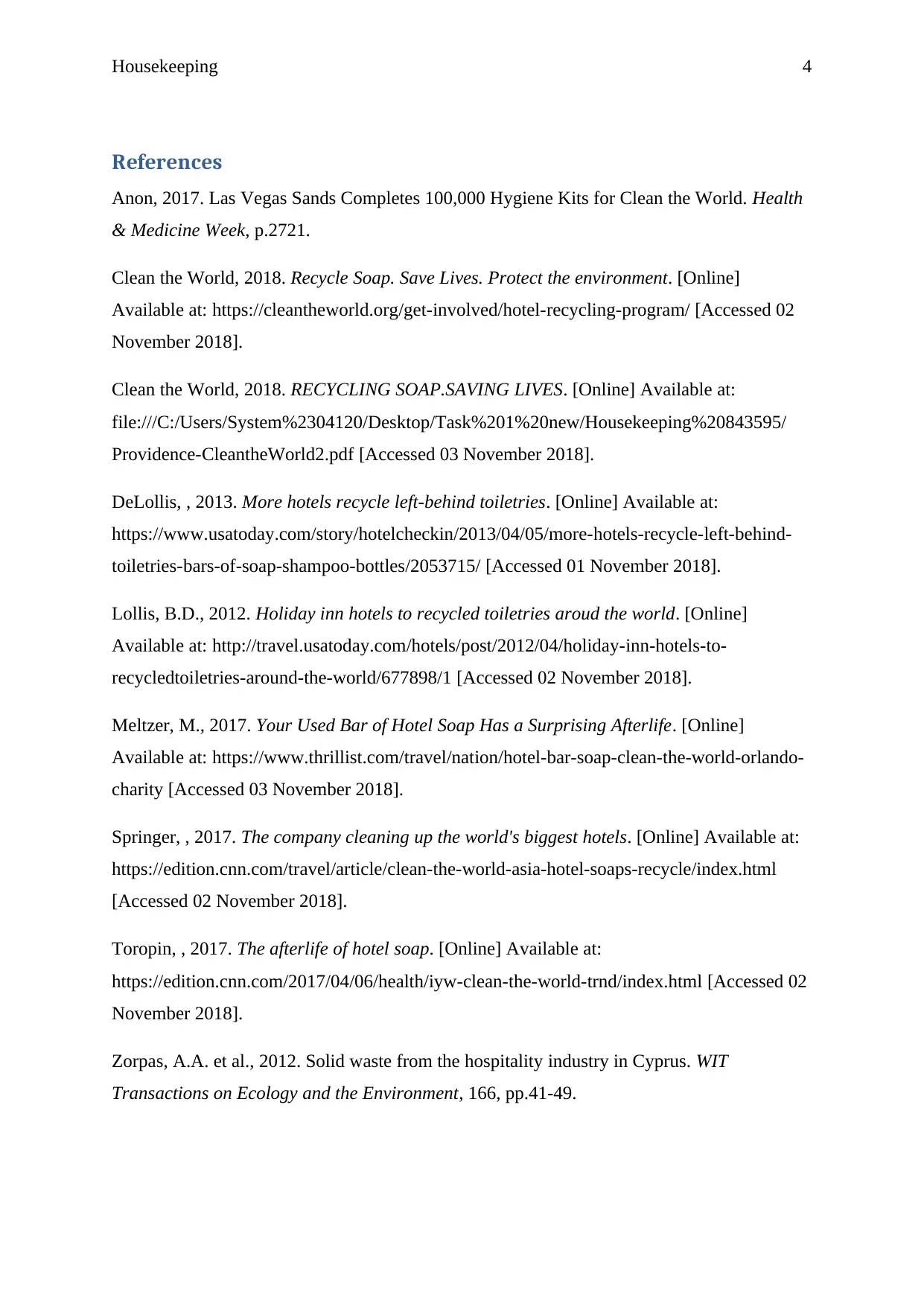
Housekeeping 4
References
Anon, 2017. Las Vegas Sands Completes 100,000 Hygiene Kits for Clean the World. Health
& Medicine Week, p.2721.
Clean the World, 2018. Recycle Soap. Save Lives. Protect the environment. [Online]
Available at: https://cleantheworld.org/get-involved/hotel-recycling-program/ [Accessed 02
November 2018].
Clean the World, 2018. RECYCLING SOAP.SAVING LIVES. [Online] Available at:
file:///C:/Users/System%2304120/Desktop/Task%201%20new/Housekeeping%20843595/
Providence-CleantheWorld2.pdf [Accessed 03 November 2018].
DeLollis, , 2013. More hotels recycle left-behind toiletries. [Online] Available at:
https://www.usatoday.com/story/hotelcheckin/2013/04/05/more-hotels-recycle-left-behind-
toiletries-bars-of-soap-shampoo-bottles/2053715/ [Accessed 01 November 2018].
Lollis, B.D., 2012. Holiday inn hotels to recycled toiletries aroud the world. [Online]
Available at: http://travel.usatoday.com/hotels/post/2012/04/holiday-inn-hotels-to-
recycledtoiletries-around-the-world/677898/1 [Accessed 02 November 2018].
Meltzer, M., 2017. Your Used Bar of Hotel Soap Has a Surprising Afterlife. [Online]
Available at: https://www.thrillist.com/travel/nation/hotel-bar-soap-clean-the-world-orlando-
charity [Accessed 03 November 2018].
Springer, , 2017. The company cleaning up the world's biggest hotels. [Online] Available at:
https://edition.cnn.com/travel/article/clean-the-world-asia-hotel-soaps-recycle/index.html
[Accessed 02 November 2018].
Toropin, , 2017. The afterlife of hotel soap. [Online] Available at:
https://edition.cnn.com/2017/04/06/health/iyw-clean-the-world-trnd/index.html [Accessed 02
November 2018].
Zorpas, A.A. et al., 2012. Solid waste from the hospitality industry in Cyprus. WIT
Transactions on Ecology and the Environment, 166, pp.41-49.
References
Anon, 2017. Las Vegas Sands Completes 100,000 Hygiene Kits for Clean the World. Health
& Medicine Week, p.2721.
Clean the World, 2018. Recycle Soap. Save Lives. Protect the environment. [Online]
Available at: https://cleantheworld.org/get-involved/hotel-recycling-program/ [Accessed 02
November 2018].
Clean the World, 2018. RECYCLING SOAP.SAVING LIVES. [Online] Available at:
file:///C:/Users/System%2304120/Desktop/Task%201%20new/Housekeeping%20843595/
Providence-CleantheWorld2.pdf [Accessed 03 November 2018].
DeLollis, , 2013. More hotels recycle left-behind toiletries. [Online] Available at:
https://www.usatoday.com/story/hotelcheckin/2013/04/05/more-hotels-recycle-left-behind-
toiletries-bars-of-soap-shampoo-bottles/2053715/ [Accessed 01 November 2018].
Lollis, B.D., 2012. Holiday inn hotels to recycled toiletries aroud the world. [Online]
Available at: http://travel.usatoday.com/hotels/post/2012/04/holiday-inn-hotels-to-
recycledtoiletries-around-the-world/677898/1 [Accessed 02 November 2018].
Meltzer, M., 2017. Your Used Bar of Hotel Soap Has a Surprising Afterlife. [Online]
Available at: https://www.thrillist.com/travel/nation/hotel-bar-soap-clean-the-world-orlando-
charity [Accessed 03 November 2018].
Springer, , 2017. The company cleaning up the world's biggest hotels. [Online] Available at:
https://edition.cnn.com/travel/article/clean-the-world-asia-hotel-soaps-recycle/index.html
[Accessed 02 November 2018].
Toropin, , 2017. The afterlife of hotel soap. [Online] Available at:
https://edition.cnn.com/2017/04/06/health/iyw-clean-the-world-trnd/index.html [Accessed 02
November 2018].
Zorpas, A.A. et al., 2012. Solid waste from the hospitality industry in Cyprus. WIT
Transactions on Ecology and the Environment, 166, pp.41-49.

Housekeeping 5
⊘ This is a preview!⊘
Do you want full access?
Subscribe today to unlock all pages.

Trusted by 1+ million students worldwide
1 out of 6
Your All-in-One AI-Powered Toolkit for Academic Success.
+13062052269
info@desklib.com
Available 24*7 on WhatsApp / Email
![[object Object]](/_next/static/media/star-bottom.7253800d.svg)
Unlock your academic potential
Copyright © 2020–2025 A2Z Services. All Rights Reserved. Developed and managed by ZUCOL.
